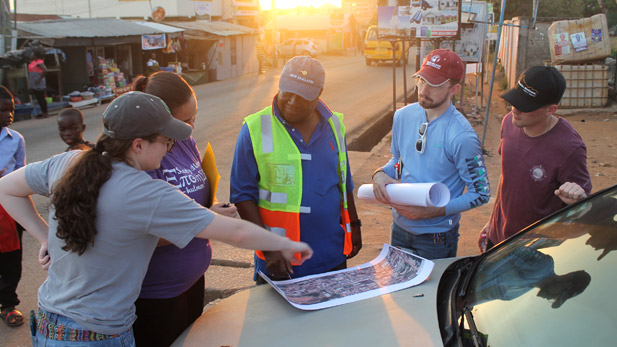Civil Engineering Seniors Go the Distance to Transform Ghana Community

As part of a capstone project, five civil engineering seniors traveled to Ghana to develop solutions for a neighborhood struggling to meet the growing demand upon infrastructure, sewage systems and building development.
There may be college undergraduate engineering design projects that take place on campus, in the institution’s home community, or across the country, but few projects have students traveling half way across the world in hopes of developing possible solutions to engineering problems that could make a difference in a foreign community.
Five senior civil engineering students have been on that mission this school year and traveled nearly 6,000 miles to see firsthand how they can help a growing community in Ghana. Their project mission includes addressing issues in long-standing drainage, traffic, sanitary waste management, and infrastructure. They interviewed civic leaders, professional engineers and citizens, and collected valuable data that will form the basis of their design recommendations, which will be finalized early this spring.
This is another unique global educational experience that Rose-Hulman and the Department of Civil and Environmental Engineering provides to their students.
The Ayeduase suburb within the city of Kumasi, Ghana, has been hard pressed to meet the growing demand upon roadways, sewage systems, and building development due to the increased population of the nearby Kwame Nkrumah University of Science and Technology (KNUST), the country’s second largest college.
Each student team member is contributing to address separate community needs. Michaela Biske is examining how to reduce traffic congestion and increase the safety of pedestrian walkways along a main roadway within the neighborhood. Kajun Miller is designing updated stormwater drainage and sanitary sewer systems, while Parker Brady is exploring better solid waste management for the community, as well as a better way for residents to collect and reuse rainwater.
Meanwhile, Anna Thompson is designing a four-story hostel facility that will be used as a dormitory for KNUST students. Matt Robinson is designing the structural foundations and footings for the hostel as well as providing a geotechnical investigation of the soil and ground surface within the community.
Miller states, “The nexuses of these engineering processes and solutions is what makes a nation healthy and maximizes the quality of life for residents. With this project our senior design group can improve the welfare and quality of living for the community, as well as continue to encourage the local culture and traditions.”
A problem for Brady has been convincing Ayeduase residents to trust using water in the community. They currently prefer to buy bottled water.
“I have to design a water treatment and storage system that the community trusts is safe, all without being in Ayedause,” says the senior from Minneapolis, Minn. “It will be very rewarding in the end, when I know that I’ve helped improve their quality of life.”
Meanwhile, Biske had 15-minute periods in the morning and evening to take roadway measurements and observe traffic flows within the community. “An entire day of traffic data would have been better,” notes the native Macomb, Mich. “This project has taught me that not everything will go the way you plan. You need to be ready for those changes and remain calm throughout the process.”
Thomson adds, “The biggest challenge in this project is its scope. It is so large and complex with many different factors that contribute to each subdiscipline. We had to come up with a plan that was both feasible and would still be beneficial to the community.”
The Rochester Hills, Mich., native adds, “Getting to travel to this community and speak to the locals is something I will never forget and will take with me for the rest of my life. As we were able to communicate with our client, with other professional engineers and with residents of the community, our decisions became clearer to us. This project has taught me how to be a better team member and how to work with others to achieve the best outcome possible.”
Robinson says, I’ve enjoyed the challenge of creating engineering decisions based upon less soil data than would likely have been available in a project within the U.S. Creating a safe design when not many specifics are known about the site is something that has been unique to this project and is teaching me critical decision-making skills that I will hold onto in my professional career.”
Providing invaluable assistance to the students have been Ghana-based professional engineer Kwaku Boampong of ABP Consult and former president of the Ghana Institution of Engineers, and Rose-Hulman faculty mentor John Aidoo, a native of Ghana.
“The students have been asking all of the right questions and are seeking the best solution for our community,” stated Boampong during a winter campus visit to the team. “What they’re doing is so important. Their ideas could transform parts of our town that have been neglected for far too long.”